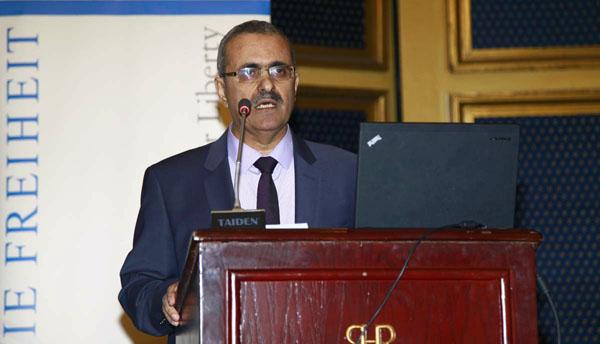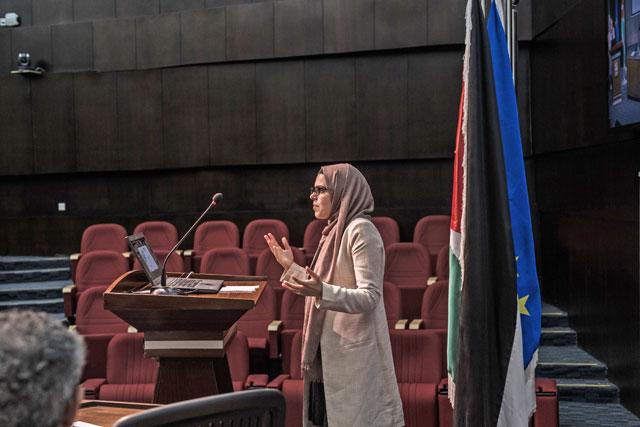You are here
Stakeholders highlight challenges of absorbing Syrian university students
By Laila Azzeh - Dec 15,2015 - Last updated at Dec 15,2015

Higher Education Ministry Secretary General Hani Dmour speaks at a seminar on Tuesday (Petra photo)
AMMAN — The issue of whether local universities are capable of accommodating more Syrian students, was under the spotlight at a seminar held in the capital on Tuesday.
While university representatives highlighted their experience in absorbing Syrian students on their campuses, the Higher Education Ministry argued that enrolling additional numbers of Syrian refugees was a "difficult" option.
"The growing demand for higher education by Jordanian and non-Jordanian students, and the return of Jordanians who were studying in unstable neighbouring countries, make receiving more Syrian students a tremendous burden," Higher Education Ministry Secretary General Hani Dmour said.
Speaking at the seminar, held by the Jordanian Club of Humboldt Fellows and the Friedrich Naumann Foundation for Liberty, Dmour noted that the number of Syrians at local universities has been rising significantly over the past three years, totalling 5,718 in 2015, from 4,432 in 2014 and 3,137 in 2013.
"The overall number of non-Jordanian students enrolled in higher educational programmes at private and public universities topped 37,276 in the 2014-2015 academic year," he highlighted, adding that they constituted 13 per cent of the total of 313,500 students.
The decline in government support to the sector, increased educational costs, which stand at an average of JD7,000 a year per student, and the static university fees are some of the main challenges currently facing higher education in the Kingdom, according to Dmour.
"This year, public and private universities received around 5,000 students above their capacity. This will only widen their budget deficits and make them resort to banks or the funds allocated for their employees," he said.
In addition, designating university seats for additional students will affect the quality of education and increase unemployment as the "local market is unable to offer job opportunities to the huge number of graduates", Dmour pointed out.
Highlighting the positive aspects of absorbing refugee students in local universities, Ibrahim Laafia, first counsellor and head of operations at the EU Delegation in Jordan, cited the case of Steve Jobs, the co-founder of Apple. The "poor" migrant was capable of setting up a company with a "turnover of around eight times Jordan's GDP", Laafia noted.
He said the EU committed a total of 120 million euros between 2013-2017 to support the education of Syrian refugees aged between 6 and 18, while in higher education, 8 million euros has been earmarked for training, he said.
"At the present moment, contracts are being signed and implemented to provide access to higher education for Syrian refugees and vulnerable Jordanian students from host communities. Some 3,100 students will receive language and academic skills training."
Laafia added that another 340 students will be enrolled in universities; 750 will be offered recognised distance education; and 500 will be part of one- to two-and-a-half years of professional programmes.
Jordan will also benefit from a 33-million euro EU grant to provide higher education to Syrian refugees in the region, he noted.
"The EU has not forgotten about Jordanian students," Laafia said, citing the EU's ERASMUS + programme for higher education.
Academics and representatives of UN organisations also participated in the seminar, titled "Syrian Refugee Students in Jordan's Higher Education System — challenges, experiences and policies".
They pointed to some of the main obstacles hindering the smooth enrolment of Syrian students in universities, such as the lack of documents and transcripts as many left their country without copies of their certificates.
"Also, local solutions are needed here. It is not feasible to have scholarships abroad," said Eddie Dutton, UNESCO's education in emergencies project officer.
He explained that many students are afraid to leave Jordan when they get scholarships abroad, in case they are unable to come back and be reunited with their families.
Al Quds College Dean Ayman Maqableh cited language proficiency and "distrust" in online and blended educational systems in Jordan as the main challenges hindering the enrolment of Syrians in universities.
Despite these problems, Al Ahliyya Amman University President Sadeq Hamed noted that Syrian students already in the university are "doing well and managed to cope".
"At first, we had the problem of having two groups of Syrians: opponents and supporters of the Syrian regime. That was a challenge we managed to overcome. The Syrian community at our university is a coherent and united one," he said.
Related Articles
AMMAN — “The HOPES project truly carries the meaning of hope itself for us.
The higher education council and the ministry will soon revise laws governing the country’s higher education institutions, a senior official said, highlighting plans to establish a technical education directorate in the near future.
AMMAN — An agreement to establish a Sino-Jordanian university in the Kingdom is expected to be signed soon, according to an official.The agr
















